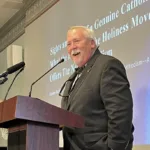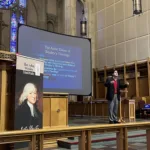This past summer, I visited my old church in Tennessee. When I walked in, I expected to see many children and young people bustling inside the church as it had been before. However, my expectation turned into a disappointment. A church that flourished with young people, was now a church that could barely muster a youth group.
A recent Relevant Magazine article cites a new Barna study finding Generation Z is the most non-religious generation recorded in U.S history. Generation Z refers to those who were born between 1999 and 2015. According to the Barna study, 13 percent of Generation Z refers to themselves as atheists. That is more than double of adults who identify as atheists.
As a younger millennial and having many friends from Generation Z, I submit that the reasons behind their non-religious worldview mirrors those of atheist adults. Some of Gen Zers reasoning includes: (1) they believe there is no tangible evidence of a God; (2) the science that they learned at school conflicts with the teachings of the Bible; (3) they are less exposed to the Church’s traditional teachings; (4) political issues like the rights of LGBTQ, immigration, and poverty influences the way teens view Christianity; and, I believe mainly (5) teens are struggling to understand how suffering and pain can exist if God is a truly loving.
Furthermore, we live in an age where communication predominately takes the form of technology. Social media is the new way of building friendships. We live in a culture where we can access information whenever and however we want. News travels fast and we want to know information instantly and in a personal format.
This is portrayed well through my generation’s use of social media and how it impacts teenagers’ thoughts. Take for example the Facebook page Humans of New York. The page is devoted to promoting a photography blog created by Brandon Stanton. He takes pictures of people in New York and writes down quotes from his subjects. As the page has become more popular, he’s using the virtual platform as a tool to tell stories from around the globe. He’s done interviews with refugees, prisoners, illegal immigrants, LGBTQ, and more. Many of the posts contain stories of love, loss, and a pursuit of happiness. Although, I might not agree with all the political perspectives, I’ve become more empathetic and learned a vast amount of what these people are going through. I can imagine how some of my friends might read of others’ hardships online and either deduce there is no God or adopt a distorted understanding of Him.
In addition, there are other social media pages where millennials and Generation Z try to form their own opinions and their own philosophy by posting online. Tumblr is another form of social media that is widely used. Teens usually post different questions that they are pondering. Through these postings, other people comment and try to figure out how they can answer difficult questions. Many often come to empty conclusions or conclude that there is not a need for a God.
Not only does social media influence our thinking, but also movies and TV shows. Many movies and TV shows are writing to empathize and portray unbiblical truths as moral absolutes. Young people often watch various broadcasters argue that good can be found in energy, or the universe, or “my truth” without God and that only evil comes from being too religious.
However, this does not mean that all sources of media should be dropped. I want to emphasize that these sources of media can be used wisely to guide teens who are interested or questioning different philosophical questions to Biblical truth. For an example, I sometimes have my best conversations and dialogues through social media. I frequently use Instagram to post pictures and write something about the Gospel. I use it as a form to encourage my friends and even those who might not necessarily be Christian. Although social media and other influences can be used to turn teenagers and young adults away from Christ, I believe it can be used for God’s Kingdom and possibly help grow our church youth groups.
Even though our world is constantly changing, the Gospel and our God never changes. I pray that Generation Z will seek and find the overwhelming love of Jesus and realize that God is the one true answer.
Editor’s note: Esther Chung is a Spring 2018 Institute on Religion & Democracy Intern.





Comment by William on January 28, 2018 at 3:21 pm
Esther,
Thank you for sharing this most insightful description of a genuinely tragic phenomenon. I’m a senior citizen and have sadly been seeing this coming and growing for at least the last 50+ years. Although my immediate family is blessed to be active, confessing Christians —- so, so many around us abjectly reject Jesus and the church. In fact the rejection of Jesus has grown into a deep hatred in many quarters and is now flowing from so many directions that it is hard to keep up. Obviously, another Great Awakening is so desperately needed for our society. Our society needs a great repentance, on the level of Nineveh, and a turning to Jesus. May God have mercy on this age!
Comment by Andy B on January 31, 2018 at 10:33 am
Esther,
I appreciated the thought and time put into this piece. I’ve had similar experiences wondering why students aren’t engaging like they did even 5-6 years ago.
Since a conversation a few weeks back with a colleague who is a vocational youth minister I have been reflecting on similar thoughts for a while. He shared how much harder it is to get students to engage in anything other than a weekly Sunday evening gathering. It isn’t for lack of enthusiasm, but more a general busyness that includes clubs, sports, band, test prep classes, splitting time with divorced parents, jobs, etc… I have to wonder what it looks like to have an “online youth ministry” similar to taking a class online only that encourages discipleship and meaningful relationship. I believe something like this could be pivotal for reaching Zers, but even though I’m a millennial I don’t know how best to pursue this.
I remember strategic thought and conversation about creating “third places” that provide natural opportunities for discipleship, fellowship, and safe-positive recreation/relaxation. I never would have guessed that in a few years “third places” wouldn’t be physical places at all but online communities.
In a big picture/rhetorical way I guess I’m asking what it looks like to lead a Bible study on snapchat?
Comment by Esther Chung on February 1, 2018 at 10:32 am
Thank you, Andy for your concern and passion for reaching the younger generations for Christ! I actually never thought about what it would look like to lead a Bible Study on social media, specifically Snapchat. I think it would be a good starting point in starting to engage students who are busy and cannot physically be at church and those who does not know Christ. However, I believe that this should just be a supplement, and it shouldn’t be in place of the local church. I also think that being “too busy” is rather an excuse, and the priority is not Christ. It’s so vital to disciple the younger generations that church should be a first and foremost priority. I think this is the only way to keep the young age group inside the church. Furthermore, in Hebrews 10:25 says that we should “meet together” and encourage one another. I think there is some value in doing Bible Study through social media, but it is more important to emphasize to come together within the local church.
Comment by Chuck on February 1, 2018 at 5:47 pm
Esther,
Good piece. I am a baby-boomer and it is my belief that social media is a big factor in this issue. Friends and relationships are being redefined right before our eyes and not for the better IMO. If young people today do not see the need for deep, genuine, messy, flesh and blood relationships with other human beings then what makes them think they have a need for a relationship or friendship with God? Their friends are on a computer screen and their god is in a book. Talk about vanity of vanities and chasing after the wind! God help us.
Comment by Jim on February 2, 2018 at 12:58 pm
As I read this, the question in my mind is “what about the parents?” The current generation in the article are the offspring of Generation X. See the Pew Article (http://www.pewforum.org/religious-landscape-study/generational-cohort/generation-x/) for the profile of this the parental group. It is a sobering reality to realize they have raised GEN Z. Add to this the tremendous number of pulpits that are more interested in sermons about how to become a better citizen that they are about the sacrifice and cost of being a Christ-follower and we can see this is where we are in 2018. As already noted, absent the intervention of the Holy Spirit, there is no hope for this religious morass we in the U.S. find ourselves in.
Comment by Ken Southgate on February 4, 2018 at 12:37 am
Hey Esther! I was just transferred to a local church as pastor after over 30 years in campus ministry. While I can see the validity of these points of view, I would just like to add one thing: Go interview the college and H.S. kids that do have a personal relationship with Christ. Starting about three years ago, this small group began to impress me with their devotion to Christ and willingness to be transparent about it with their peers, regardless of how they thought they might be treated. This small group of true disciples is very aware of their peer culture, but not intimidated by it very often. I began to call them “The New Apostles.” I can see them being the spearhead of the next great awakening. The culture is so spiritually hungry, dry and brittle that it will cross the nation like a California forest fire, when it finally comes. Let’s all pray it happens soon, in God’s good time. We are burying the rest of their unsaved peers at a record pace. Have hope!